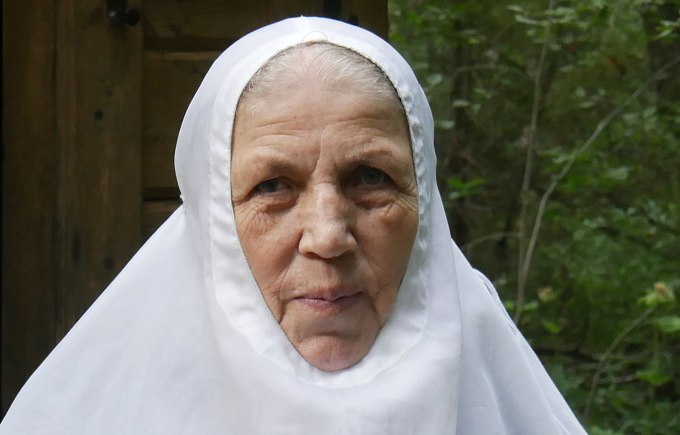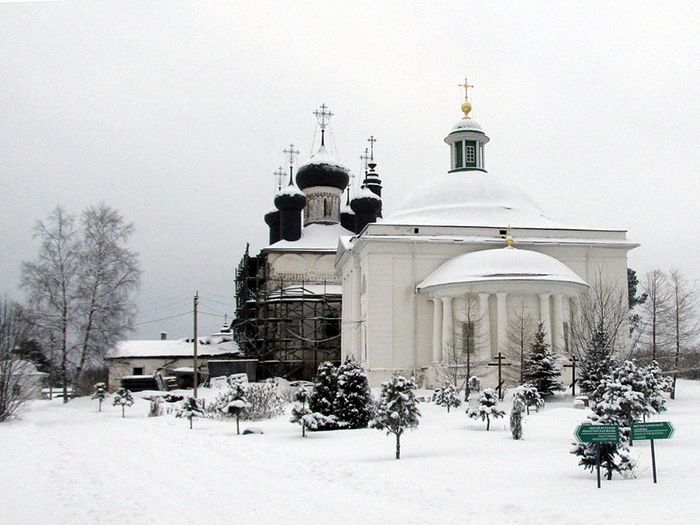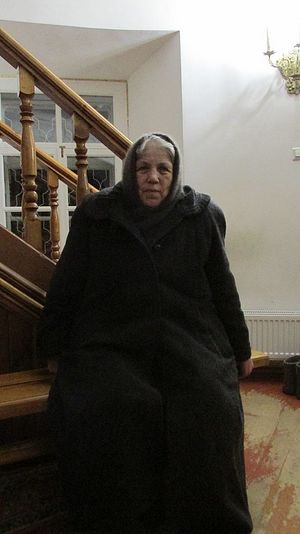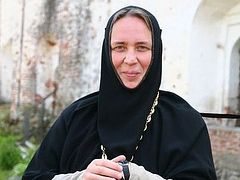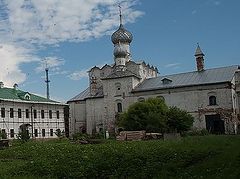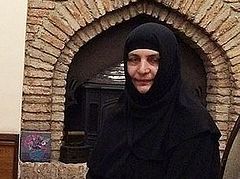Abbess Evphalia (Lebedeva), who labored for more than twenty years over the restoration of the Resurrection Monastery in Goritsy in the Vologda Province, shares her thoughts about why people become monastics, discusses the saving quality of the ability not to answer injustices with anger, the advantage of peacocks and the ignorance of Germans, and recalls the recent history of Russia—the Russia of martyrs.
—Matushka, you have been in the Goritsy Monastery for twenty-one years already; under you the monastery has been rebuilt practically from scratch. How did this happen?
—Not even “practically,” but precisely from scratch. You see what a church we have—we began with that. There was a collective farm office here. Everything was in ruins, dilapidated, and dead—that’s how we found the church. We didn’t despair, we just started working. We ourselves labored, asking people for help, and they responded. So the church was restored, little by little, with prayer and hard work. I’ve been here for twenty-one years already, and we’ve rebuilt the living quarters during that time—at first without amenities, of course, and then heating, and then the plumbing, and, in general, it’s become easier to live. Well, easier to live in the building, sorry; but to live, I don’t know, I’m not sure.
—You mean…
—I mean life. It is so interesting! It never ceases to amaze me; and glory to God.
—Matushka, in your opinion, in your observations, why do people join monasteries? We hear quite often that someone ran off to a monastery because her husband was bad, so her life was bad, so she went to a monastery! Is this correct?
—No, this is not correct! God forbid someone should go to a monastery with such thoughts.
—So why do people become monastics?
—Well, apparently it’s how the Lord has arranged it. For example, how did I come here? I had a good job, no husband—I wasn’t married, but at thirty I left for the Zolotonoshe Monastery. There weren’t any monasteries in Russia then, but the Holy Protection Monastery was open in Zolotonoshe, and I went there joyfully.
—And where is that?
—Cherkasy Province, Ukraine; Krasnogorsk Holy Protection Monastery. I had heard a little bit about it when I lived in the world, and at first I went just to see it, and then I just stayed there. I had a great job as a medic. At first I worked in a pharmacy, then on site, in the pharmacy kiosk at the hospital, then as a pediatrician, and most recently as a histology lab technician.
—How did your co-workers feel about your decision? After all, it was soviet times.
—Surprisingly, with understanding and kindness—Christ helped, of course. The head doctor at our hospital where I worked respected my decision, and even wished me all the best when we parted. I left work in September 1980, went to Ukraine on New Year’s, and by the feast of the Meeting of the Lord I was already living at the monastery.
—If I understand correctly, you don’t “run” to a monastery, but monasticism is a calling?
—Yes, it’s a calling, as the Lord has determined, and you must hear this call. I heard it, perhaps because we were believers from childhood. I went, and I looked, and I liked it. They even invited me there immediately. They had no medic, and they said immediately, “We need a physician, come.” I agreed right away, and I lived there for fifteen years, and twenty-one here already, in the Northern Thebaid.
—Tell us please, Mother, are the main difficulties at Goritsy Monastery just the material ones? Or are there some others there?
—Oh, you said it! The youth are so different now! No one wants to work! They simply don’t want to. They’re looking for an easy path to salvation.
—You mean not just physical work?
—Of course. But physical is also necessary! Without the physical—what will you eat? But you also have to work on yourself! You have to work, to labor over yourself. You have to retrain yourself—you can’t just do whatever you want. Things that seem good to you aren’t always good and salvific, right? That means you have to work on yourself, to trim yourself, and force yourself. Sometimes I want to say something pertinent in response, but it’s better not to.
—But is it possible?
—You mustn’t! Just reflect upon your salvation—then you’ll be quiet for quite a while, then all speech is exhausted. Many young people have come here, and many have left… May God grant them spiritual and bodily health, and health of mind as well.
—I understand that the youth are prone to willfulness? Is that true?
—Yes, it’s true! “I’m going to do what I want! I don’t want to do what you said.” To listen, to obey… Don’t go to another monastery with your own rules, they say. I always cherished Zolotonoshe, I always remember, and I’m constantly calling them. Wondering how they live…
—How do they live?
—Well!
—Is there any anger, rejection, or condemnation against Russia and Russians?
—Nothing of the sort. There’s no anger—not at the monastery. I don’t think it exists in any Orthodox monastery. That people are fighting and antagonizing is terrible. But there are completely different people in the monasteries there.
—What kind of people?
—All kinds—old, young—no one says an impudent word. They come and greet you and bow. The young bow to the elderly, and the young bow to the young—there’s no questions and answers, no gossip. But they have their own difficulties now: Everyone’s become sicklier compared to when we were there. The people were stronger, but now, of course, they’ve all become weaker.
—According to your words, the youth have turned out to be more willful, but weaker? Is there some correlation here?
—Yes, here; but there in Ukraine they're weaker for sure, but just the same there isn't that stubborn self-will. There’s an old root there, which is seniority—it shows its example. But of course there is a correlation: The more you sin, the weaker you become—any doctor will tell you that.
—Or a coroner. And why do you think we have such difficulty with self-will?
—Probably because we lived so long without God. But then again, they always had God. I remember an entire family that went to monasteries. Two sisters went to the monastery. Their mother was sick and went to a monastery, Nun Liveria—she’s died already; and their father went to another monastery, to Pochaev—Monk Spyridon. And there are enough such families there.
—That is, they had piety in their blood?
—In their blood, yes.
—But for us, it seems we lived without God for too long. We became estranged.
—Estranged, yes. But now, glory to God, Mother Ariadna is working in a school. She has several groups of children already, and even and adults’ class—adults go to study with her. They even ask her to go to the kindergarten. They are returning to Christ.
—A hundred years without God—it’s frightful!
—Even a minute without God is frightful. But here—a hundred years. It’s a terrible picture.
—Are we just now reaping the fruits of the seeds that were planted a century ago? How can we accept these fruits without murmuring and without judgment?
—Our priest always tells us not to judge—anyone! We must work on ourselves. However you are is how your family will be. If you want someone to judge, judge yourself—your favorite.
—However, obviously very different people willingly come to your Goritsky Resurrection Monastery with great love. So we can say that our people have a need for communion with Christ?
—There is a need. During the years when the monastery was being reborn, several drug addicts here even became good people. One, Olga, even got married here; she came from St. Petersburg. She’s a ship captain’s daughter, and the captain came to visit us. He asked if he could bring his daughter here. His daughter brought a friend with her, Lena. They came together, and both girls left as normal women, of course. The girls even had a child each, and their parents were raising them. They got married again, and Olga even came here to get married.
—So there is a need?
—Yes, how could there not be? How many such people have we had—the third was also the daughter of some important boss. They came and asked if she could stay. She also became a decent person, with three kids. She got married—you see? That’s the kind of stuff that happens here.
—Therefore, if we take into account the love of the people for the monastery, it means the need exists, and that means the situation in our monasteries is far from bad, since people are coming here? If it was bad, they just wouldn’t come here.
—They wouldn’t come, no. And how many former alcoholics there are! And the poor! It’s the same with them. They also became worthy people. And they didn’t even have mothers. Many people have already come through here.
—Mother, tell us, when is it necessary to use strictness, and when is it necessary to be merciful? How can we sort this out?
—You have to look at each person. Some you can grant clemency to right away, and some you can intimidate right away. It all depends on the person, I think.
—It’s difficult for me sometimes: I judge my children, and I always want to use strictness right away.
—Well, children do better with affection. Strictness is simpler, but mercy and a kind smile are better.
—That’s if the father is smart.
—Children accept affection more. You’re not going to achieve much with them by austerity, I think. There was a family here last year, asking if their daughter could stay with us. Yes of course, we said. Well, she was here for a while and her mother came for her, and she said, “Leave me with Mother!” Not with grandma, but with Mother! And—there came a roar! “How am I supposed to leave you here? You have to study music!” “But Mother is going to take me to Kirillov! There’s a music school there!” They took off with a roar, parted ways. She called me two days ago: “Mother, I love you, I hug you! I really want to see you!” I said, “Well, come in summer.” “Maybe in winter?” “If they bring you in winter from Novorossisk [in the south of Russia]—you’re welcome!” She’s in first grade; she’s still young.
—What does the monastery do now, besides the fact that tourists come here in the summer? Tourists… anyways, let’s leave them alone. There are pilgrims, there’s an apiary, and there’s a barnyard, as far as I know.
—Yes, there’s a barnyard, with cows, goats, and chickens. There are peacocks in the summer, for beauty and for the children. Sunday schools are constantly coming from all over Russia, and not just Sunday schools, but even sports schools, police academies, military schools. Many people come here. The workers here are usually from everywhere.
—So it turns out that people have a desire to help the monastery.
—Yes, and there’s nothing to add to that, really. People help a lot. We wouldn’t have been able to plant such gardens without people’s help. People from Cherepovets are always visiting our children’s home.
—Is there any benefit to it?
—There’s a benefit. They work four hours every day. The cabbage beds always need weeding. Once their summer vacation starts, they come here for three months. It’s such good work therapy.
—And the children already know that tea isn’t sweet all by itself?
—Of course. There’s a need for work therapy. Sometimes you have to try to knock some sense into people. One girl said, “I should throw this old rag away—they’re giving us new jackets tomorrow!” I said, “What do you mean, ‘giving?’ Did you earn it? They’re not giving it! They’re not giving you a jacket tomorrow! You should sew this hole. Sit down and sew.” Something like that. They’re already beginning to realize. And by the end of the children’s home they’re already embroidering tablecloths, for example. Is it useful work? Will it come in handy in life? Of course it will.
—It sounds like staying in the monastery is an education in a Christian attitude towards work. If St. Sergius of Radonezh worked for his brother for bread, then here it’s the same: To receive something, you have to earn it. That’s a healthy Christian attitude towards work. It’s not slavish, but healthy: honest work—honest pay. No freebies, and no cheating.
—It’s a healthy attitude, which must be cultivated from childhood. But sometimes it happens that adults forget, and everyone suffers.
—The children aren’t just doing work therapy in the monastery, I hope?
—We’re not savages! They have a four-hour work day, then they have an excursion, and then it’s their own time; they go swimming, there’s a creek nearby. They didn’t go swimming last year—the weather was too bad. But they go swimming every year, it’s warm every year.
—Mother, all these boats with tourists that come here in the summer, they probably annoy you—all those Germans and Frenchmen?
—We don’t speak with them.
—How?! They come here!
—They just pass through; their guide leads them around the monastery territory—they don’t even take them into the church. We don’t allow it. Whoever asks to go pray and light candles, which happens—we meet such groups—we take them quietly, and they are quiet in the church: They quietly pray and light candles. But those tourists don’t do that.
—I remember when some cackling crowd of tourists in shorts and bikinis…
—No, I don’t see that. Firstly, we simply don’t talk with them, we don’t communicate in general. The guides bring groups from Kirillov, by boat, for example; they come one after another! And they all speak in whatever language they need, and we don’t pay any attention to them. They don’t concern us. However, curiosity grabs them, and they look in the greenhouse sometimes.
—And at the peacocks, for sure!
—Of course the peacocks, let them look—we don’t mind; but to go to the greenhouse—we don’t want that. But they will look anyways—what kind of tomatoes, if we grow such and such a kind, and they wonder: How can we have such huge northern tomatoes!?
—How do you get such tomatoes?
—They’re special varieties. We pick these varieties, we try them, and if we like them, then the next year we choose those seeds and plant them. Our tomatoes are always large and good.
—Is prayer during work important?
—Very important. Very!
—Would you say that your honey, your tomatoes, all of your animals and all the rest are among the fruits of prayer?
—Yes, and how! You won’t be able to grow anything without prayer. The apiary is the same. Last winter was pretty rough for us, and we had to buy more bees, but still. But, thank God, we just checked—everything is fine now.
—Are there instances, Mother, where after meeting with someone, you just had joy in your heart?
—Everyone’s the same for me, I think. I’m happy to meet with everyone. People come, they ask questions, and you just talk with them. You have to see the image of Christ in everyone. How could you not receive Christ joyously?
People themselves feel that all is well with Christ, that He will never leave them in trouble. We have a child in France, who was born there.
—How so?
—A woman, a Frenchwoman, came here. Actually, she was Russian, but living in France. I said to her, “Whoever needs children please, beseech the Mother of God.” She said, “Hmm, I don’t need to. I’m old already, but I will pray for my neighbor.” Before she even got back to France she got pregnant, and she hadn’t had children in ten years! They had had a son. Then she told me everything. These are the kinds of miracles that take place.
—But for a monastery, miracles are probably normal.
—Forget about it. We have a church standing here, thank God. We have living quarters too.
—How does it happen that there’s usually a peaceful spirit in monasteries? There’s no animosity, no aggression, none of that kind of stuff?
—Ask Christ. He calls people, and they come to Him—therefore everything is peaceful. Could things really be unpeaceful with Christ? In any situation, even in those that seem terrible and unjust to you, you must be with Christ—He will help and save you. That’s how there’s peace.

